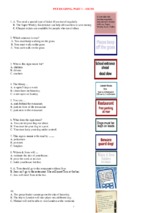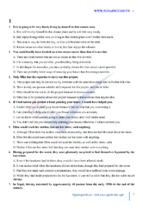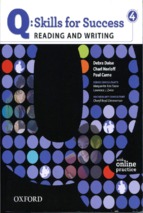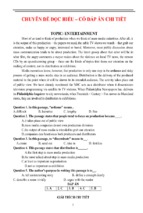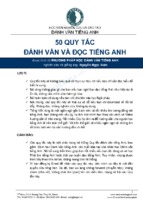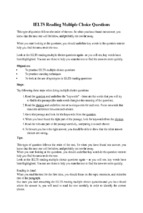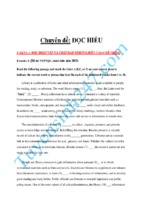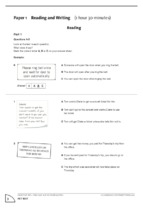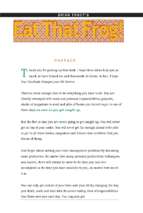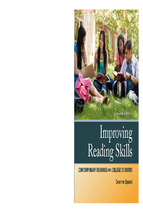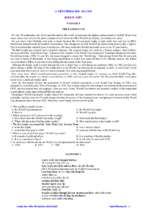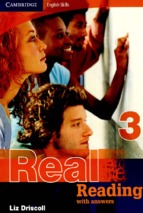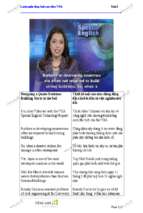Pearson Education Limited
Edinburgh Gate, Harlow,
Essex CM20 2JE, England
and Associated Companies throughout the world.
ISBN-13: 978-0-582-77962-4
ISBN-10: 0-582-77962-6
First published in Great Britain by Victor Gollancz 1998
This edition first published by Penguin Books 2003
Contents
page
Introduction
iv
Chapter 1
A Man and a Boy
1
Chapter 2
SPAT
6
Chapter 3
The Dead Duck Day
15
Chapter 4
Marcus's Plan
20
Chapter 5
New Trainers
27
Chapter 6
Ellie
34
Chapter 7
Christmas at Fiona's
41
Chapter 8
Falling in Love
45
Chapter 9
Depressions
50
7 9 10 8
Original copyright © Nick Hornby 1998
Text copyright © Penguin Books 2003
Typeset by Ferdinand Pageworks, Surrey
Set in ll/14pt Bembo
Printed in China
SWTC/07
All rights reserved; no part of this publication may be reproduced, stored
in a retrieval system, or transmitted in any form or by any means,
electronic, mechanical, photocopying, recording or otherwise, without the
prior written permission of the Publishers.
For a complete list of titles available in the Penguin Readers series, please write to your local
Pearson Education office or to: Penguin Readers Marketing Department,
Pearson Education, Edinburgh Gate, Harlow, Essex CM20 2JE.
56
Chapter 11 Growing Up
Published by Pearson Education Limited in association with
Penguin Books Ltd, both companies being subsidiaries of Pearson Plc
Chapter 10 A Trip to Cambridge
63
Activities
71
Introduction
Chapter 1
They were all staring so hard at the scene of the crime that they didn't
notice the park-keeper standing next to them. Marcus felt very frightened.
He would be in big trouble now.
'One of your ducks has died,' said Will. He made it sound like the
saddest thing he'd ever seen. Marcus looked up at him. Maybe Will
wasn 't such a bad guy.
About a Boy is the story of the growing relationship between
Marcus, a twelve-year-old boy, and Will, a 36-year-old man. Marcus
is having problems at home and at school. Will wants a life without
responsibilities; he isn't interested in children, marriage or work.
But Will is interested in attractive single mothers, and he invents a
two-year-old son so that he can join a single parents' group. When
he meets Marcus and his mother, his life begins to change.
About a Boy is very funny and enjoyable, but it also has a much
more serious side.
The writer, Nick Hornby, was born in 1957 and grew up in
north London. He studied English at Cambridge University, then
worked for the Korean company Samsung. Later, he worked as a
teacher and journalist before starting to write fiction.
Nick Hornby has written four books: Fever Pitch (1992); High
Fidelity (1995); About a Boy (1998) and How to be Good (2001).
The stories all take place in north London, and are mainly about
relationships. The first three books have been made into
successful films. In About a Boy, the popular British actor Hugh
Grant plays the character of Will. The end of the story was
changed for the film. Which ending do you prefer?
IV
A M a n and a B o y
Will Freeman was thirty-six years old and he had never had a job
in his life. Sometimes he thought about working. He looked
through the job advertisements in newspapers and wrote
occasional letters to employers, but he was never invited to
interviews.
He didn't mind. He was OK as he was. He was a cool guy
with a cool lifestyle. He read quite a lot; he saw films in the
afternoons; he went running; he cooked nice meals for himself
and his friends. When he got bored, he went to Rome or New
York or Barcelona for a few days.
Will didn't need to work for money because in 1938 his father
had written a very successful Christmas song. Many famous
singers had made recordings of this song, and each time Will's
father had received royalties. Since his death the royalties had
come to Will.
So Will had become rich without having to work at all. He
was happy with his life. He lived in a nice flat in London and
drove a fast car. He liked women and had lots of girlfriends, but
he never got too involved with them. He preferred to look at
other people's lives from the outside, like watching TV. If a
relationship with a woman became complicated, he ended it. He
wanted to keep his life simple.
In the evenings Will usually went out with friends. These
were guys who worked in music shops or belonged to the same
sports clubs as Will, or who were part of the same pub-quiz
team. They weren't close friends - but they were good enough
for a drink or a meal.
The evenings were fine, but Will had a lot of free time during
the day because all his friends were at work. So he filled the time
1
bath, tidying his flat, going to the shops, watching Countdown.
Countdown was an afternoon TV quiz show and it was his favourite
programme. Sometimes he wondered how his friends had time to
work. How could a person work and have a bath on the same day?
Will didn't like children. He wasn't interested in them, and he
didn't want any responsibility for them. But his friends, John and
Christine, had two. The second was a baby girl, born just the
week before, and Will had been invited to see her.
When he arrived at John and Christine's flat, there were
children's toys everywhere. Pieces of brightly coloured plastic
were spread all over the floor, videos lay out of their cases near
the TV, a white cloth over the sofa was covered with dirty brown
marks . . . How could people live like this?
Christine came in holding the new baby while John was in
the kitchen making tea. 'This is Imogen,' she said.
'Oh,' said Will. 'Right.' He paused. What did people usually
say about babies? 'She's . . . ' he began, but stopped again. It was no
good. He decided to ask Christine about herself instead. 'How
are you, Chris?' he asked.
'Well, you know. I'm rather tired.'
Why? A lot of parties?'
'No. I've just had a baby.'
'Oh. Right.'
John came into the room, carrying three cups of tea. 'Barney's
gone to his grandmother's today,' he said, for no reason that Will
could understand.
'How's Barney?' Barney was two, and interesting only to his
parents, but Will knew he should ask John something.
'He's fine, thanks,' said John. 'He's still getting used to Imogen,
but he's lovely'
Will had met Barney before and knew that he wasn't lovely,
but he decided not to say anything.
'I'm fine, thanks.'
'Don't you want your own family?'
I can't think of anything worse, thought Will. 'Not yet,' he
said.
We're worried about you,' said Christine.
'I'm OK as I am, thanks,' said Will.
'Maybe,' said Christine, and smiled.
Will was beginning to feel very uncomfortable. Why did they
want him to have children? Children would make him very
unhappy. If John and Christine wanted children, and to be
unhappy, that was fine. (Will was sure that John and Christine
were very unhappy, even if they didn't realize it.) But why should
they want him to be unhappy too?
Will could see only one reason for having children. When you
were old and poor, then they could look after you. But Will had
plenty of money, so he didn't need toys on the floor or dirty
sofas.
John and Christine used to be OK, he thought. Will and a
girlfriend had gone out to nightclubs with them once or twice a
week, and they had all had a lot of fun. But since John and
Christine had had children, everything had changed. Will didn't
want to meet Imogen, or hear how Barney was. He didn't want
to hear about Christine's tiredness. He decided not to visit them
again.
'We were wondering,' said John, 'whether you'd like to be
Imogen's godfather?' The two of them looked at Will, smiling
and waiting for his reply.
Will laughed nervously. 'Godfather?' he said. 'You mean . . .
church and things? Birthday presents? If you two are killed in an
air crash, I'll have to look after her?'
'Yes.'
'You're joking, aren't you?'
2
3
you're a very serious and responsible person.'
'Oh, no,' said Will quickly. 'No, I'm not. I'm really a very
shallow kind of person. Thank you very much for asking me, but
I can't think of anything worse.'
He didn't stay much longer.
•
Not far away, in the Holloway area of London, a twelve-year-old
boy called Marcus was lying in bed, unable to sleep. He was
worrying about his mum and his new school.
Marcus's mum was called Fiona, and she and Marcus had only
been in London for a few weeks. They had moved there on the
first day of the summer holidays because Fiona had got a new
job. Before moving to London, they had lived in Cambridge,
where Marcus's father, Clive, still lived. Fiona and Clive had
separated four years ago.
Marcus thought London was quite boring. He and Fiona
hadn't done much in the holidays. They'd been to see Home
Alone 2, which wasn't as good as Home Alone 1. They'd been to
have a look at his new school, which was big and horrible. And
they'd had lots of talks about London and the changes in their
lives. But really they were sitting around waiting for their
London lives to begin.
Marcus had had two kinds of life. The first, which had ended
when he was eight, was the normal, boring kind, with school and
holidays and homework and weekend visits to grandparents. The
second kind was more confused because there were more people
and places in it: his mother's boyfriends and his dad's girlfriends;
flats and houses; Cambridge and London. It was surprising how
many things had changed when Fiona and Clive's relationship
ended.
But Marcus didn't mind. Sometimes, he thought, he even
4
More happened, and that was a good thing.
But now Marcus was very worried about his mum. She had
started crying a lot in London - much more than in Cambridge.
He didn't know why she cried. He wondered if it was about
boyfriends. Marcus didn't mind if his mum had a boyfriend. She
was pretty, he thought, and nice, and funny sometimes. He
wanted his mum to meet someone who would make her happy.
He couldn't help his mum with her problems, and she
couldn't help him with his other big problem - school. His first
day at his new London school had been a disaster.
Marcus knew that he was different from most other kids of his
age. He wasn't right for schools. Not big secondary schools like
the one in London. His school in Cambridge hadn't been so bad.
The children there were younger, and there were lots of weird
kids there, so Marcus hadn't felt uncomfortable.
It was OK not to be right for some things, he thought. He
knew that he wasn't right for parties because he was very shy.
That wasn't a problem because he didn't have to go to parties.
But he had to go to school.
Marcus couldn't talk to his mum about his problems at school,
because she couldn't help. She couldn't move him to another
school. Even if she did move him, it wouldn't make any
difference. He'd still be himself, and that, it seemed to Marcus,
was his real problem. The other kids laughed at him because he
was weird. They laughed because he had the wrong trousers, the
wrong shoes and the wrong haircut.
Marcus knew that he was weird partly because his mum was
weird. She was always telling him that clothes and hair weren't
important. She didn't want him to watch 'rubbish' TV or listen to
'rubbish' music or play 'rubbish' computer games. All the other
kids spent their time doing these things, but Marcus had to argue
with his mother for hours and he usually lost. She could explain
5
He learnt the reason over dinner on their first evening out,
when Angie told him that she was a single mother with two
and a lot of men didn't like other people's children.
Will wanted to push the table over and run out of the
restaurant, but Angie was a very beautiful woman.
'Really, it's no problem. I've never been out with a mum
before, and I've always wanted to. I think I'd be good at it.'
'Good at what?'
Right. Good at what? What was he good at? That was the big
question which he had never been able to answer. Maybe he
would be good at children, although he hated them. Maybe he
should give John and Christine and baby Imogen another
chance. Maybe he was going to become Uncle Will!
'I don't know. Doing things that kids like.'
For the next few weeks, he was Will the Good Guy, and he
loved it. It wasn't even very difficult. He played with Angie's
children, and took them to McDonald's and to parks and for a
boat trip on the river. It was a very good arrangement, he
thought. He had never wanted to be a father, but this was
different. He could walk hand-in-hand with a beautiful woman
while the children played in front of them. Everybody could see
him doing it. And at the end of the afternoon, he could go home
again if he wanted to.
Angie made Will feel very good about himself. Suddenly he
became better-looking, a better lover, a better person. And she
especially loved him because he wasn't her ex-husband, who had
problems with drink and work, and who was sleeping with his
secretary.
Will went out with Angie for six weeks, but there were some
things that he was beginning to find difficult. Once he booked
tickets for the opening night of a new film, but Angie was half an
hour late because she couldn't get a babysitter. And when they
spent the night together, it always had to be at her place and she
didn't have a video machine or many CDs.
6
7
Bob Marley and Joni Mitchell. And why it was more important
to read books than to play on the Gameboy that his dad had
given him.
He was quite happy at home, listening to Joni Mitchell or
reading books, but it didn't do him any good at school. It made
him different, and because he was different the other kids made
him feel uncomfortable.
It wasn't all his mum's fault. Sometimes Marcus just did weird
things. Like the singing. He always sang songs to himself inside
his head but sometimes, when he was nervous, the song just
came out of his mouth. It had happened in his English lesson on
the first day of his new school. The teacher was reading and all
the other students in the room were quiet. Suddenly, for no
reason at all, Marcus had started to sing, and all the other kids had
laughed at him.
Chapter 2
SPAT
Will first saw Angie in a music shop off the Holloway Road. She
had lots of thick blonde hair, big blue eyes and a lovely sexy
voice. She reminded him of Julie Christie, a beautiful film star.
Two days later, he saw her again in a cafe and started a
conversation. By the time they had finished their coffee, he had
her phone number.
Will was rather surprised that Angie wanted to go out with
him. He had never been out with a woman who looked like Julie
Christie before. Women like her didn't go out with men like
Will. They went out with other film stars, or lords, or racing
drivers.
But just when Will was thinking about ending the relationship,
Angie decided to finish it.
'Will, I'm so sorry, but I'm not sure this is working. It's not
your fault. You've been great. It's me. Well, my situation anyway.
I've met you at the wrong time of my life and I'm not ready for a
serious new relationship.'
It really was very strange, Will thought. Angie had believed he
was serious about her, and he hadn't been serious at all. Now she
was starting to cry. He had never before watched a woman cry
without feeling responsible, and he was rather enjoying the
experience.
One Monday morning Marcus's mum started crying before
breakfast, and it frightened him. Morning crying was something
new, and it was a bad, bad sign. It meant that it could now start at
any time of the day without warning.
When he went into the kitchen, she was sitting at the kitchen
table in her night clothes, a half-eaten piece of toast on her plate,
her eyes red from crying. Marcus never said anything when she
cried. He didn't know what to say. He didn't understand why she
did it, and because he didn't understand, he couldn't help. So he
stood there staring at her with his mouth open.
'Do you want some tea?' she asked him in a sad little voice.
'Yes. Please.' He made some toast, drank his tea and picked up
his bag. Then he gave his mother a kiss and went out. Neither of
them said a word. What else could he do?
On his way to school, he tried to work out what was wrong
with her. What could be wrong that he didn't know about? He
didn't think it was money problems. She had a job - she was a
music teacher - so they weren't poor, although they weren't rich
either. But they had enough money for the flat, and for food, and
for holidays once a year, and even for occasional computer games.
What else made you cry? Death? But he'd know if anybody
important had died. He'd seen all his relatives - his grandparents,
his uncle Tom and uncle Tom's family - at a party the week
before, and they'd all been fine. Was it about men? He knew his
mum wanted a boyfriend because she joked about it sometimes.
But if she joked about it, why should she suddenly start crying
about it?
So what else was there? He tried to remember the other
things that people cried about on TV programmes. Prison? An
unwanted baby?
But Marcus had forgotten about his mum's problems by the
time he was inside the school gates. He had his own problems to
think about. A group of kids usually bullied him on his way
across the playground. Today, though, they were at the other end,
so he reached his classroom without difficulty.
His friends Nicky and Mark were already there, playing a
game on Mark's Gameboy. He went over to them.
'All right?'
Nicky said hello, but Mark was too busy to notice him.
Marcus tried to watch the game, but he couldn't see the
Gameboy very well, so he sat on a desk, waiting for them to
8
9
'You don't have to be sorry for anything. Really.'
Of all the evenings he had spent with Angie, he loved the last
one the best. The relationship had been perfect, and had finished
in a perfect way too. Usually when his relationships with women
ended, he felt guilty, but this time he had nothing to feel guilty
about.
Will knew then that there would be other women like Angie
- bright, attractive single mothers, thousands of them all over
London - and he knew he had a lot to offer them. He could
sleep with them, make them feel better about themselves, be a
parent for a limited time, and walk away without feeling guilty.
What more could a man want?
•
finish. But when they finished, they started another game; they
didn't offer him a game or put the Gameboy away. Marcus felt he
was being shut out, and he didn't know what he'd done wrong.
'Are you going to the computer room at lunchtime?' he asked.
That was how he knew Nicky and Mark - through the
computer club. It was a stupid question because they always went
to the computer room. It was the only place where they would
be safe from the other kids.
'Don't know,' replied Nicky after a time. 'What do you think,
Mark?'
'Don't know,' said Mark. 'Probably.'
They weren't real friends - not like the friends he'd had in
Cambridge — but he could talk to them because they were all
different from the other kids in the class. All three of them wore
glasses, none of them was interested in clothes and they all liked
computer games.
Two older boys came and stood in the doorway. 'Give us a
song,' they said to Marcus.
Marcus didn't know these boys, but they'd probably heard
about him singing in the English class. Mark and Nicky started to
move away, leaving him alone. Then the older boys started
insulting Mark and Nicky, and making jokes about girls and sex.
Mark turned the Gameboy off, and all three of them stood
waiting for the boys to get bored and go away. Marcus tried to
play a game inside his head, listing different kinds of chocolate.
At last the two older boys left. The three of them didn't say
anything for a time. Then Nicky looked at Mark, and Mark
looked at Nicky, and finally Mark spoke.
'Marcus, we don't want you with us.'
'Oh,' said Marcus. 'Why not?'
'Because of them.'
'They're not my problem.'
'Yes, they are,' said Mark. We never got into trouble with anyone
10
before we knew you, and now we have problems every day.'
Marcus understood. They would be better without him. But
he had nowhere else to go.
•
Will was looking for ways to meet single mums like Angie, but
he didn't know where to find them. Where did single mums go
and how could he get their phone numbers? Then he had a
wonderful idea. He would pretend to be a single father and join a
single parents' group. So he invented a two-year-old son called
Ned.
'I'm a single father. I have a two-year-old son. I'm a single
father. I have a two-year-old son,' he told himself.
But he couldn't actually believe it. He didn't feel like a parent.
He was too young, too old, too stupid, too intelligent, too cool,
too impatient, too selfish, too careless, too careful. When he
looked in the mirror, he couldn't see a dad, especially a single
dad.
He telephoned a single parents' group called SPAT (Single
Parents - Alone Together) and spoke to a woman called Frances.
SPAT met on the first Thursday of each month in a local adult
learning centre, and Frances invited Will to the next meeting. He
was very worried that he'd get something wrong, like the name
of his imaginary son - he couldn't stop thinking of him as Ted,
not Ned.
The centre was a depressing place with lots of classrooms. Will
listened for the sounds of a party but he couldn't hear anything.
Finally he noticed a small piece of paper on a classroom door
with the word SPAT! on it.
There was only one woman in the room. She was taking
bottles - of white wine, beer and water - out of a box and
Putting them on a table in the centre of the room. All the other
tables and chairs had been pushed to the back of the room. It was
11
the most depressing place for a party that Will had ever seen.
'Have I come to the right place?' he asked the woman. She
had a sharp nose and a bright red face.
'SPAT? Come in. Are you Will? I'm Frances.'
Will smiled and shook her hand.
'I'm sorry there's nobody else here yet,' she said. 'A lot of
people are late because of problems with babysitters.'
'Of course,' said Will. He was wrong to come on time, he
thought. He should pretend to have babysitting problems too. But
then the other members of SPAT began to arrive, all women in
their thirties, and Frances introduced him to each of them. The
most attractive was a tall, blonde, nervous-looking woman. After
she came into the room, he stopped looking at anybody else.
'Hello,' he said. 'I'm Will. I'm new and I don't know anybody.'
'Hello, Will. I'm Suzie. I'm old and I know everybody.'
He laughed. She laughed. He spent most of the evening with
her. She talked a lot and he listened. He was very happy to listen
because he didn't want to talk about Ned. Suzie had been
married to a man called Dan, who had left her the day before she
gave birth to her daughter Megan.
Suzie told him about the other women in the room. It was the
same story - their husbands had all left them with children to
look after. Will began to feel very depressed about being a man.
How could men behave so badly?
'I'm sorry,' said Suzie at last. 'I haven't asked you anything
about yourself. Did your wife leave you?'
'Well . . . er . . . yes.'
'And does she see Ned?'
'Sometimes. She's not very interested in him.' He was
beginning to feel better; he could show her that women could
behave badly too. He was acting, yes, but he was doing it well,
just like Robert De Niro.
'How does Ned feel about that?' asked Suzie.
Some parts of Marcus's life continued normally. He went to his
dad's in Cambridge for the weekend and watched a lot of TV.
On the Sunday he and his dad, and Lindsey, his dad's girlfriend,
went to Lindsey's mum's house. Lindsey's mum lived by the sea,
and they went for a long walk on the beach.
Marcus liked Lindsey's mum. He liked Lindsey too. Even his
mum liked Lindsey. Marcus felt better after the weekend in
Cambridge. He had a good time with everybody and nobody
seemed to think he was weird.
But the day after he got back, he came home from school and
found his mum lying on the floor with a coat over her.
'Didn't you go to work today?'
'This morning. I was sick this afternoon.'
'What kind of sick?' asked Marcus.
She didn't reply, and Marcus felt angry. He was only a kid and
things couldn't continue like this. He was having an awful time at
school and an awful time at home, and school and home were
almost the only places he knew. So someone was going to have
to help him, and that person had to be his mum. She had to do
something about it. He was only a kid, and she was his mum, and
if he felt bad it was her job to stop him feeling bad.
'What kind of sick?' he asked again in a rough voice.
She began to cry and Marcus felt frightened.
'You've got to stop this.'
'I can't.'
'You've got to. If you can't look after me, then you'll have to
find someone who can.'
12
13
'Oh . . . he's a good little boy,' said Will. 'Very brave.'
To his surprise, he was beginning to feel quite upset. Suzie put
a hand on his arm.
'She likes me,' Will thought. 'Great!'
•
His mum turned over on her stomach and looked at him.
'How can you say I don't look after you?'
'Because you don't. You make my meals and I could do that.
The rest of the time, you just cry. That's . . . that's no good. That's
no good to me.'
She cried even more then. Marcus went upstairs and played a
computer game, but when he came downstairs again, she had got
up and was cooking supper.
'You're going to a picnic on Saturday,' she said suddenly.
'A picnic? Where?'
'In Regent's Park.'
'Who with?'
'Suzie.'
'Not that SPAT crowd.'
'Yes, that SPAT crowd.'
'I hate them.' When Marcus and his mum had first moved to
London, they had gone to a SPAT summer party in someone's
garden. It had been full of horrible little kids, all about ten years
younger than Marcus.
'Are you going?' he asked.
'No. I need a rest. You told me to find someone to look after
you. So that's what I'm doing. Suzie's better at it than I am.'
Suzie was Fiona's best friend; they'd known each other since
their schooldays. She was nice and Marcus liked her a lot. But he
didn't want to go to a SPAT picnic.
'I can stay here. I'll keep out of your way. I can sit in my room
all day, playing games.'
'I want you to get out. Do something normal. We're not doing
each other any good.'
Marcus was shocked. What did she mean, they weren't doing
each other any good? She wasn't doing him any good, but what
had he done to her? He couldn't think of anything. He felt like
crying too.
14
Chapter 3
The Dead Duck Day
Will wanted to go to the SPAT picnic in Regent's Park because
Suzie was going. But he knew that Suzie would expect Ned to
be there too, so he had to invent a reason why Ned couldn't go.
He telephoned Suzie on the morning of the picnic and told her
that his ex-wife had taken Ned out.
'But that's terrible, Will,' said Suzie. 'You can't let her change
your plans like that.'
'I know, I know,' he said. 'And she's taken my car too. Can I go
with you to Regent's Park?'
'Yes, of course,' replied Suzie. 'I'm bringing a twelve-year-old
kid too - Marcus, my friend Fiona's son. She's asked me to look
after him for the day.'
All the way to the park Suzie talked about Will's ex-wife. She
was very angry about Paula's behaviour. Had he called her Paula?
Will couldn't remember. Things were getting rather
complicated, he thought. How much longer could he continue
pretending? And how could he ever invite Suzie round to his
flat? There were no toys there, and he didn't even have two
bedrooms.
They walked through the park to the lake. Suzie was pushing
her daughter, Megan, in a pushchair, and Marcus was walking
beside them. Will thought Marcus was a weird kid. He had a very
strange haircut and odd clothes.
'I don't even know what you do,' said Suzie.
'Nothing.' He usually invented a job, but he had told enough
lies. He had to give Suzie something that was real.
'Oh. Well, what did you do before?'
'Nothing.'
'You've never worked?'
'Well, only for a day or two. My dad wrote a famous song, and
I live from the royalties.'
15
Marcus turned away, so Will began to talk to Suzie.
'Do you often have to look after him?' he asked.
'Not often. But Fiona, his mum, isn't feeling very well.'
'She's going crazy,' said Marcus calmly. 'Cries all the time.
Doesn't go to work.'
'She isn't crazy. She just needs a rest.'
They could see the SPAT crowd of mothers and children
sitting by the lake in front of them. The mothers were pouring
juice into cups, and the children were eating sandwiches.
Will played with the children for most of the afternoon. He
kept away from the adults sitting on blankets under a tree because
he didn't want to have to answer difficult questions about Ned.
He kept away from Marcus too. Marcus was walking round the
lake, throwing bits of his sandwich at the ducks.
Later, Suzie came to talk to him. 'You miss him, don't you?'
'Who?' He meant it; he had no idea what she was talking
about. But then he remembered about Ned. 'I'll see him later.'
'What's he like?' asked Suzie.
'Oh . . . Nice. He's a really nice boy.'
Before Suzie could ask more questions, Marcus ran over to
them. He seemed very nervous and upset.
'I think I've killed a duck,' he said.
Will, Suzie, Marcus and Megan stood on the path by the edge
of the lake, staring at the duck's dead body in the water.
'What happened, Marcus?' Will asked.
'I don't know. I was just throwing a piece of my sandwich at it.
I didn't mean to kill it.'
'What's that in the water next to it? Is that the bread you
threw at it?'
'Yes,' said Marcus. He didn't like Will much, so he didn't want
to answer his questions.
'That's not a sandwich, that's a loaf,' said Will. 'I'm not
surprised the duck was killed.'
'Perhaps I didn't kill it,' said Marcus. 'Perhaps it died because it
was ill.'
Nobody said anything.
They were all staring so hard at the scene of the crime that
they didn't notice the park-keeper standing next to them. Marcus
felt very frightened. He would be in big trouble now.
16
17
'Michael Jackson makes £60 million an hour,' said the weird
kid. 'How much do you make?'
'Marcus!' said Suzie. 'So what's this song, Will?'
Will told them. He hated telling people because the title
sounded so silly.
'Really?' Suzie and Marcus both started singing the same part
of the song. People always did this, and he hated that too.
'But haven't you ever wanted to work?' asked Suzie.
'Oh, yes, sometimes, but I never seem to do anything about it.'
It was true. Every day for the last eighteen years he had got up in
the morning thinking about finding a job. But by the evening he
had lost interest.
He decided to talk to Marcus. If he made friends with Marcus,
Suzie would think he was a nice guy.
'So, Marcus,' he said, 'who's your favourite footballer?'
'I hate football.'
'Right,' said Will. 'Well, who's your favourite singer?'
'Are you getting these questions out of a book?' asked Marcus.
Suzie laughed, and Will's face turned red.
'No,' he said. 'I'm just interested.'
'OK,' said Marcus. 'Well, it's Joni Mitchell.'
'Really?' said Will in surprise. 'Does everyone in your school
listen to Joni Mitchell?'
'Most people.'
Will was confused. He read a lot of modern music magazines,
but none of them had said anything about Joni Mitchell's new
popularity.
'One of your ducks has died,' said Will. He made it sound like
the saddest thing he'd ever seen. Marcus looked up at him. Maybe
Will wasn't such a bad guy.
Marcus put the key in the door of the flat and opened it, and a
new part of his life began, without any warning at all.
His mum was half on and half off the sofa. Her face was white,
and there was a pool of sick on the carpet and an empty pill
bottle beside her.
He couldn't speak. He didn't know what to say. He didn't cry
either — the situation was much too serious for that, so he just
stood there. But Suzie dropped the car seat and ran over to his
mum and started screaming at her and shaking her. Marcus was
confused. Why was Suzie so angry with someone who wasn't
very well?
Suzie shouted at Will to call for an ambulance, and told
Marcus to make some black coffee. His mum was moving now
and making a terrible noise that Marcus had never heard before
and never wanted to hear again.
'Fiona! How could you do this?' Suzie screamed. 'You've got a
kid! How could you do this?'
Suddenly Marcus understood that his mum had tried to kill
herself. He had seen some shocking things, mostly on videos at
other people's houses, but they hadn't frightened him because
they weren't real life. This situation with his mum was different
because it was very real. There wasn't anything shocking in the
room, and he could see that his mum wasn't dead. But it was the
most frightening thing he'd ever seen, and he knew he'd never
forget it.
When the ambulance arrived and Fiona was taken to hospital,
the ambulance men didn't want to take Marcus and Megan too.
So Suzie went to the hospital with Fiona, and Will drove Marcus
and Megan there in Suzie's car.
When they arrived at the hospital, Fiona had already been
taken away.
'What's happening?' asked Will. He was finding the whole
experience very interesting — almost enjoyable.
'I don't know. They're pumping her stomach or something.
She was talking a little in the ambulance. She was asking about
you, Marcus.'
'That's nice of her.'
Suzie tried to put her arms round him. 'Listen, Marcus,' she
18
19
'I was told it was your boy's fault,' said the park-keeper. 'It's a
crime to kill a duck, you know.'
'Are you suggesting that Marcus killed this duck? Marcus loves
ducks, don't you, Marcus?'
'Yes,' said Marcus. 'They're my favourite animal. I mean, my
favourite bird.' This was rubbish, because he hated all animals, but
he thought it helped.
'I was told he was throwing enormous loaves at it.'
'No,' said Will. 'He was throwing bread at the duck's body. He
wanted to sink it because the sight of a dead bird was upsetting
my friend's little girl, Megan.'
There was a silence. At last the park-keeper spoke.
'Well, I'll have to go into the water and get it,' he said.
Marcus felt much better. He wouldn't have to go to prison.
They were walking back to the rest of the SPAT group when
suddenly a strange thing happened. Marcus saw - or thought he
saw - his mum. She was standing on the path in front of them
and she was smiling. But when he looked again, she wasn't there.
•
Usually when Suzie took Marcus home after a day out, she left
him outside his flat and waited until he got inside. But today she
parked the car and lifted Megan out in her car seat. She was
never able to explain why she had done this. Will wasn't invited,
but he followed them in.
said. 'This isn't about you. You k n o w that, don't you? I mean,
kitchen, as Suzie had told h i m to do, w h e n he saw a n o t e on the
you're n o t the reason she . . . you're not the reason she's here.'
kitchen table. He picked it up and sat d o w n .
' H o w do you k n o w ? ' He pushed Suzie away and went to get a
drink from a machine.
' W h a t can you tell a kid whose m o t h e r has just tried to kill
herself?' Will asked. He really wanted to know.
'I don't know,' said Suzie worriedly. 'But we'll have to think of
something.'
T h e y waited in the hospital for a long time. M e g a n went to
sleep and Marcus ate a lot of sweets and chocolate from the
machine. N o n e of t h e m talked m u c h . At last a w o m a n came over
to see t h e m — not a nurse or a doctor, but somebody official.
'Hello. D i d you c o m e in with Fiona Brewer?'
'Yes. I ' m her friend Suzie, and this is Will, and this is Fiona's
Dear Marcus,
A big part of me knows that I'm doing a wrong, stupid, selfish,
unkind thing. But unfortunately that's not the part that has
control of me now.
None of this is about you. I've loved being your mum, always,
although I've found it difficult sometimes. And I don't know why
it isn't enough for me, but it isn't. I just feel very tired, and there
doesn't seem to be anything to look forward to.
Things will be better for you than they were before. Really. You
can go to your dad's, or Suzie has always said she'd look after you.
Love you,
Mum
Marcus was still sitting at the kitchen table w h e n his m u m came
son Marcus.'
' R i g h t . We're keeping Fiona here for the night. Is there
somewhere Marcus could go?'
' H e can stay w i t h me tonight,' said Suzie.
She put M e g a n back into the car seat and they made their way
back from the hospital w i t h Suzie and Megan. She could see
immediately w h a t he'd found.
' I ' m sorry, Marcus. I'd forgotten about the note.'
'You forgot? You forgot you wrote a letter about killing
yourself?'
out to the car park.
'I'll see you soon,' said Will. 'I'll call you.'
'Well, I didn't think I'd ever have to r e m e m b e r it, did I?' She
'I h o p e things are OK with N e d and Paula,' Suzie said.
laughed at that. She actually laughed. T h a t was his mother. W h e n
For a m o m e n t Will didn't k n o w w h o she meant. N e d and
she wasn't crying at breakfast, she was laughing about killing
Paula, N e d and Paula . . . ? Ah, yes — his ex-wife and son.
' O h , it'll be fine. Thanks.' He said goodbye and w e n t to find a
taxi. It had been a very interesting experience, but he wouldn't
want to repeat it every night.
herself.
'It was stupid of me to leave Marcus here before I w e n t to get
you,' said Suzie. 'I wasn't thinking.'
'Suzie, n o n e of this is your fault. But maybe Marcus and I
ought to have a little talk alone.'
Chapter 4
Marcus's Plan
T h e next day Suzie t o o k Marcus h o m e and left h i m while she
went to get Fiona from the hospital. He was just tidying the
' O f course,' said Suzie. She gave Marcus a kiss. 'She's fine,' she
whispered, loud e n o u g h for his m u m to hear. ' D o n ' t w o r r y about
her.'
W h e n Suzie had gone, Fiona made tea and sat d o w n at the
table with Marcus.
20
21
'Are you angry with me?'
'What do you think?'
'Because of the letter?'
'Because of the letter, because of what you did, everything.'
'I can understand that. I don't feel the same as I did on
Saturday, if that's any help.'
'So your problems have all just gone away?'
'No, but . . . at the moment I feel better.'
'At the moment's no good to me,' said Marcus. 'I can see that
you're better at the moment. You've just made tea. But what
happens when I go back to school? I can't be here to watch you
all the time.'
'No, I know. But we've got to look after each other.'
Marcus was no longer interested in what his mum said; the
important thing was what she did, or what she was going to do.
She wasn't going to try and kill herself again today. She'd drink
her tea, and tonight they'd watch TV, and it would feel like the
beginning of a different, better time. But that time wouldn't last
for ever. Marcus knew that, for him, things would never be the
same again.
Two people in a family weren't enough. He'd always thought
that two was a good number, and that he'd hate to live in a family
of three or four or five. But now he could see that if there were
lots of people in a family, and one of them died, you wouldn't be
left on your own. But how could he make his family grow? He
was going to have to find a way.
•
Will kept thinking about Marcus and Fiona. There wasn't much
else happening in his life, so he had a lot of time to think about
them. He had a strange thought: perhaps he should try and help
them. He telephoned Suzie.
'I was wondering how Marcus and Fiona are,' he said.
22
'Not too bad, I think. She hasn't gone back to work, but
Marcus went to school today.'
'Listen, do you think there's any way I could help? Perhaps I
could take Marcus out?'
'Would you like to?' said Suzie. 'I could ask Fiona.'
'Thanks,' said Will. 'And it would be nice to see you and
Megan again soon.'
'Yes,' said Suzie. 'I'm looking forward to meeting Ned.'
Will bought Time Out, a magazine with information about
events in London. He was looking for something that a twelveyear-old boy might like to do on a Saturday. He tried to
remember what he liked doing at Marcus's age, but he couldn't.
Then the telephone rang.
'Hi, Will. It's Marcus.'
'Hi, Marcus.'
'Suzie said you want to take me out for the day on Saturday.
I'll come if my mum can come too.'
'What?'
'I'll come if my mum can come too. And she hasn't got any
money, so we'll either have to go somewhere cheap, or you'll
have to pay for us.'
'Well . . . wouldn't it be better with just you and me? Your
mum could stay at home and have a rest.'
Suddenly Will remembered last Saturday. They had left Fiona
at home to rest, and she had tried to kill herself.
'I'm sorry, Marcus,' he said quickly. 'I wasn't thinking. Of
course your mum can come too. That would be great.'
'We haven't got a car. You'll have to bring yours. And you can
bring your little boy if you like.'
He laughed. 'Thanks.'
'That's OK,' said Marcus generously.
'He'll be with his mum again on Saturday.'
'Fine. Come round at about half past twelve. You remember
23
where we live. Flat 2, 31 Craysfield Road, Islington, London
N1 2SR'
'Right,' said Will. 'See you then.'
•
Marcus wasn't really worried about leaving his mum. She was still
in a strange, calm mood. But he wanted her to come so that she
and Will could meet, and after that, he thought, it should be easy.
His mum was pretty, and Will seemed quite rich. They could go
and live with him and his kid, and then there would be four of
them, and four was twice as good as two. Then if one of them
died, it wouldn't matter so much.
Marcus wasn't even sure whether he liked Will or not, but it
didn't matter. He could see that Will wasn't bad, or drunk, or
violent, so he would be OK. And Marcus knew a little about
Will. One day on his way home from school, he had seen Will
out shopping and had followed him home like a private
detective.
He hadn't really found out much about him except where he
lived. But Will seemed to live alone - no girlfriend, no wife, no
little boy. Perhaps the little boy was with his girlfriend at home?
But if Will had a girlfriend, why was he trying to get friendly
with Suzie?
Will looked shocked, but she just laughed. Marcus hated it
when she made jokes to people who didn't know her well.
Will took them to a restaurant called Twenty-Eight. After
they had ordered their food, Marcus hoped that Will and his
mum would start talking. But they seemed to be finding it
difficult to start a conversation, so he had to help them.
'Don't just sit there,' he said. 'Talk to each other.'
Both Will and Fiona looked at him.
'What do you want us to talk about?' asked Will.
'Anything. Politics. Films. Murders. I don't care.'
'I'm not sure that's how conversation happens,' said his
mother.
Marcus started asking questions to make them talk, but he
wasn't very successful.
'Leave us alone, Marcus. You're making it more difficult, not
easier,' said Fiona. 'We'll start talking soon.'
Then Will asked questions about Marcus's dad, and soon they
were talking about relationships. They were talking so much that
they didn't notice when the food arrived. Marcus ate his lunch
happily. Would they move into Will's place, he wondered, or buy
somewhere new?
•
When Will arrived on Saturday, his mum was looking good,
Marcus thought. She was wearing her best trousers and a hairy
jumper, and she was wearing make-up for the first time since the
hospital, and a pair of brightly coloured earrings from
Zimbabwe.
'Thanks for everything you did last weekend,' she said. 'I'm
very grateful.'
'It was a pleasure. I hope you're feeling . . . I hope you've . . . '
'My stomach's fine. I suppose I must still be a bit crazy though.
That sort of thing doesn't get better quickly, does it?'
Will knew that Fiona wasn't his type of woman. She didn't look
the way he wanted women to look. He didn't think looks were
important to her at all. Why didn't she get a good haircut and
wear nice clothes? And she was just too strange. He could see
now why Marcus was so weird. She believed in things that Will
didn't care about, like being a vegetarian.
24
25
Will still wanted to help them. One evening he was invited to
supper at their flat. He didn't like the food very much - something
vegetarian with peas and rice and tinned tomatoes — but he quite
enjoyed the conversation. Fiona told him about her job as a music
teacher and they talked about his dad's song. But later Fiona sat
down at the piano and started to sing.
She wasn't a bad singer, but Will was very embarrassed. She
sang old pop songs from the sixties, and she sang them with deep
feeling; she even closed her eyes. Then Marcus began to sing too,
in the same way, and they made Will sing with them. It was awful.
Will could see that he'd made a big mistake about Marcus and
Fiona. He couldn't do anything to help people like them. They
were too weird and they felt too deeply about things. Will didn't
feel deeply about anything. He couldn't imagine wanting to kill
himself. He just wanted to live a long life without any problems.
Fiona called Will and left a message on his answer machine,
but he didn't call her back. He was trying to return to his old life.
He went shopping for CDs and clothes, he played a bit of tennis,
he went to the pub and to see films with friends. Then, one
afternoon, the doorbell rang. It was Marcus.
'I've come to see you,' he said.
'Oh. Right. Come in.'
Marcus marched into the sitting room, sat down on the sofa
and looked round. 'You haven't got a kid, have you?'
'Well . . . ' began Will.
Marcus got up and walked around the flat. 'Where's your
toilet?' he asked.
'It's just down the hall.'
When Marcus was gone, Will tried to think what he could say
about Ned, but he couldn't think of anything.
'You've only got one bedroom,' said Marcus when he got
back. 'You've got no children's toys in the bathroom, there are no
toys in here . . . You haven't even got any photos of him.'
'Is that your business?'
'No. But you've been lying to me, and my mum, and my
mum's friend.'
'Who told you where I live?'
'I followed you here once.'
'Why don't you just go home, Marcus?'
'All right. But I'm going to tell my mum.'
Will couldn't think of any explanation to give Marcus except
the truth — that he had invented a child so he could join a single
parents' group and meet women. And the truth sounded much
worse than he had ever intended.
'Listen, Will,' said Marcus. 'I won't say anything to my mum if
you go out with her.'
'Why do you want your mum to go out with someone like me?'
'I don't think you're too bad. I mean, you told lies, but you
seem OK. She's sad, and I think she'd like a boyfriend.'
'Marcus, I can't go out with someone just because you want
me to. I have to like the person too.'
'What's wrong with her?'
'Nothing's wrong with her, but . . . '
'You want to go out with Suzie, don't you?'
'I don't want to talk about this with you.'
'I thought so.'
'I didn't say anything. I just said . . . Listen, I really don't want
to talk about this with you. Go home.'
'OK,' said Marcus. 'But I'll be back.'
When Will had joined SPAT, he'd imagined entering the
world of single mothers and their sweet children. He hadn't
imagined Marcus, and he hadn't expected anyone to break into
his world. He was one of life's visitors; he didn't want to be
visited.
26
27
Chapter 5
N e w Trainers
Marcus knew that he couldn't make Will go out with his mum if
Will didn't want to. But he knew Will's secret now, so perhaps he
could make him do something else. He started going round to
Will's flat after school.
The first time, Will wasn't very pleased to see him. He stood
in the doorway and didn't invite Marcus in.
'What?'
'I just thought I'd come round. What are you doing?'
'Watching Countdown!
Marcus knew about Countdown — the most boring programme
in the history of television. But he wanted to get inside Will's
flat.
'I could watch it with you if you want. I really like it.'
Will looked at him for a time. 'All right. Come in.'
There were lots of interesting things in Will's flat — hundreds
of CDs, records and cassettes. There were pictures from films on
the wall, and black and white photos of people with musical
instruments.
'Who are these people? And why are they on your wall?'
'They're musicians. And they're on my wall because I like
their music and they're cool.'
'Why are they cool?'
'I don't know. Because they took drugs and died, probably.'
Marcus thought he wouldn't want pictures on his wall of
people who took drugs and died. He'd want to forget all about
that kind of thing, not look at it every day of his life.
Will made tea in the kitchen. Then they went back into the
living room and sat down on the sofa.
'Do you like school?' Will asked.
'No. I hate it.'
'Why? Do the other kids bully you?'
Marcus looked at him. How did he know that?
'Not really. Just a couple of kids.'
'What do they do to you?'
'Nothing really. Just, you know, say things about my hair and
glasses. And my singing. Sometimes . . . I sing without noticing.'
Will laughed. 'It's not funny.'
'I'm sorry. But you could do something about your hair. You
could have it cut in the way you want it.'
'This is how I want it.'
'Why do you want your hair like that?'
'Because that's how it grows, and I hate going to the
hairdresser.'
'I can see that. How often do you go?'
'Never. My mum cuts it.'
'Your mum? How old are you? Twelve? You're old enough to
get your hair cut yourself. You could get married in four years'
time. Will you let your mum cut your hair then?'
Marcus didn't think he'd be married in four years' time, but he
understood what Will was telling him and knew that Will was
right. But there was another way of looking at the situation. If his
mum was going to cut his hair in four years' time, then she would
still be alive.
Marcus visited Will a lot that autumn, and by about the third
or fourth visit he felt that Will was getting used to him. They
didn't talk about much at first, but one day Will said, 'How's the
situation at home?' for no reason that Marcus could understand.
'You mean my mum?'
'Yes.'
'She's all right, thanks.'
Marcus had never talked about it, and he'd never said how he
felt. But what he felt, all the time, every day, was a horrible fear.
This was the main reason why he came round to Will's after
school. Every time he climbed the stairs at home he remembered
the Dead Duck Day. When he saw his mum watching the news
or eating or preparing work on the dining table, he wanted to
cry, or be sick or something. But he couldn't talk about it.
'Are you still worried about her?'
28
29
'A bit, when I think about it.'
'How often do you think about it?'
'I don't know.' He thought about it all the time, all the time, all
the time. Could he say that to Will? He didn't know. He couldn't
say it to his mum, or to his dad, or to Suzie. They would all be
too worried about him. He just wanted a promise from someone,
anyone, that it wouldn't happen again, ever, and no one could do
that.
Will was wishing that he hadn't asked Marcus about Fiona,
because it was clear that the boy was very upset. Will wasn't used
to coping with people with real-life problems. He liked watching
people's problems on TV, but he'd never had anyone with
problems on his sofa before.
Sometimes they managed conversations about other things,
like Marcus's dad.
'Do you see your dad often?'
'Quite often. Some weekends. He's got a girlfriend called
Lindsey. She's nice.'
'Would you like to see him more than you do?'
'No.'
'Well, that's all right then.'
The next week, while Will was watching Countdown as usual,
he was interrupted by a long, urgent ring on the doorbell. He got
up off the sofa and opened the door. Marcus was standing on the
doorstep, and two ugly-looking boys were throwing hard sweets
at him. Some sweets hit Will.
'What do you think you're doing?' He couldn't remember the
last time he had been so angry.
The boys ran away and Will went back into the flat. Marcus
was sitting on the sofa watching Countdown.
'Who were they?'
'I don't know their names,' said Marcus, his eyes on the TV
'They're in the class two years above me at school.'
30
'Marcus, does this happen often?'
'Well, they've never thrown sweets at me before.'
'I'm not talking about the sweets. I'm talking about older kids
bullying you.'
'Oh, yes. Not those two
'No, OK, not those two. But others like them.'
'Yes. Lots.'
'Right. That's what I've been trying to find out. Your problem
is, Marcus, that you look different from other kids. That's why
they notice you. You need to look more like them. You need the
same clothes and haircut and glasses as everyone else. You can be
as weird as you want on the inside. Just do something about the
outside.'
Will took Marcus shopping in Holloway Road and bought
him a pair of expensive Adidas trainers. Marcus thought they
were cool, and Will was pleased. He couldn't remember feeling as
good as this before. He had made an unhappy boy happy, and
there hadn't been any advantage in it for him at all. He didn't
even want to sleep with the boy's mother.
But the next day Marcus's new trainers were stolen. He came
home from school wearing only a pair of black socks.
'Where are your shoes?' Fiona screamed. She hadn't noticed
that he had been wearing new trainers.
'Stolen.'
'Stolen? Why would anyone want to steal your shoes?'
'Because . . . ' He was going to have to tell her the truth,
although he knew the truth would lead to a lot of questions.
'Because they were nice ones. They were new Adidas trainers.
Will bought them for me.'
'Will who? Will, the guy who took us to lunch?'
'Yes. The guy from SPAT. He's become my friend.'
'He's become your friend?'
Marcus was right — his mum had lots of questions, but she
31
asked them in a very boring way. She just repeated the last thing
he said, made it into a question and shouted.
'I go round to his flat after school.'
'YOU G O R O U N D T O HIS FLAT A F T E R S C H O O L ? '
'Well, you see, he doesn't really have a kid.'
' H E D O E S N ' T REALLY HAVE A KID?'
When the questions had finished, he was in a lot of trouble,
although probably not as much trouble as Will. Marcus put his
old shoes back on, and then he and his mother went straight to
Will's flat. Will opened the door and Fiona immediately started
shouting at him about SPAT and his imaginary son. At first Will
looked embarrassed — he had no answers to her questions, so he
stood there staring at the floor. But as it continued, he started to
get angry too.
'Marcus is doing fine,' his mother said.
Marcus couldn't believe she'd said that. He wasn't doing fine;
his mum was being blind and stupid and crazy.
'You're joking,' said Will.
'I know he's taking some time to get used to his new school,
but . . . '
Will laughed. 'Oh, yes. And after a couple of weeks he'll be
OK? When they've stopped stealing his shoes and following him
home from school, everything will be great.'
That was wrong. They were all mad. 'I don't think so,' said
Marcus. 'It's going to take more than a couple of weeks.'
'It's OK, I know,' said Will. 'I was joking.'
Marcus didn't think there was much to joke about in the
situation. But he was very pleased that Will understood what was
happening to him at school. He'd only known Will for a short
time, and he'd known his mother all his life. So why could Will
understand, and his mother couldn't? But now his mother
understood too, because Will had told her.
'You're not going to Will's again,' Fiona said to Marcus on the
bus on the way home. 'If you've got anything to say, you say it to
me. If you need new clothes, I'll get them.'
'But you don't know what I need. I don't know what I need.
Only Will knows. He knows what kids wear.'
'We don't need that kind of person. We're doing all right our
way. Marcus, I've been your mother for twelve years. I do know
what I'm doing.'
Marcus didn't think either of them was doing all right. He
wondered if his mother had a kind of plan for him. In the next
few days he began to notice the way she talked to him. He was
interested in everything she said about what he should watch on
TV or listen to or read or eat.
She had always said it was important to talk about things, and
that she wanted him to think for himself. They had often
discussed what was bad about fashion and modern pop music
and computer games. But if she didn't like what he said, she
argued with him until he agreed with her. But he hadn't agreed,
really; he'd just lost the argument.
32
33
'Why do you invite twelve-year-old boys round to tea-parties
in your flat after school?' asked Fiona.
Will looked at her. 'Are you suggesting what I think you're
suggesting?' He went red in the face and started shouting very
loudly. 'Your son invites himself round here. Sometimes he's
followed by other kids who attack him. I could leave him
outside, but I let him in for his own safety. I won't do it again.
Now, if you've finished, you can both get out of here.'
'I haven't finished yet, actually. Why did you buy him a pair of
expensive trainers?'
'Because . . . because look at him.'
'What's wrong with him?'
Will looked at her. 'You really don't know, do you? Marcus is
being eaten alive at school by the other kids. He gets bullied
every day.'
'I've been thinking for myself,' he said,'and I want to go round
to Will's flat after school.'
'No. He's a rich guy who doesn't work, who tells lies, and
who . . . '
'He understands about school. He bought me those trainers.
He knows things.' He was getting annoyed. 'I'm thinking for
myself and . . . it doesn't work. You always win.'
'Marcus, it's not enough to tell me you're thinking for
yourself. You've got to show me too. Give me a good reason why
you want to go round to Will's.'
Marcus gave her a reason. It wasn't the right reason, and he felt
bad saying it because it made her cry. But it was a good reason
and he won the argument.
'Because I need a father.'
Chapter 6
Ellie
Will hadn't seen Marcus for a week and hadn't thought about
him much. He preferred watching Countdown alone anyway.
Then Fiona phoned.
'Marcus seems to think he needs an adult male in his life. Like
a father. He talked about you.'
'Listen, Fiona, I definitely don't need a son in my life. Why
doesn't he use his own father as a father?'
'His father lives in Cambridge. It's a long way'
'You told me not to see Marcus again. Fine. I told you I didn't
want to see Marcus again. And now you're telling me . . . I don't
understand.'
sleep with her. But conversations with her were never dull.
'I've always been worried about Marcus not having a father
around,' said Fiona. 'But he's always told me it didn't matter.
Then, when I said I didn't want him to see you, he said he
needed a father.'
'He said that because he wanted to win the argument. Never
trust a human male when he talks about his feelings.'
'Really? Well, maybe it's best if he doesn't see you.'
'What do you want me to do if he rings the doorbell?'
'Don't let him in.'
'Right.'
Marcus was waiting for Fiona at home. He didn't like the idea
of his mum talking to Will because he'd stopped believing that
he and his mum and Will and Ned were going to live together in
Will's flat. Ned didn't exist, and Will and Fiona didn't like each
other very much.
When Fiona came back, he looked at her face to see if she was
angry or depressed, but she seemed OK.
'Did you have a good time?'
'It was OK. But you're not going round there again. He's not
going to answer the door. He told me.'
Marcus wasn't worried. He knew how loudly Will's doorbell
rang inside the flat, and he knew he could ring it for a very long
time.
They met in a quiet pub. Will had never been alone with Fiona
before. He didn't find her attractive and he certainly didn't want to
Fiona had made a complaint to the school about Marcus's new
trainers being stolen, so he had to go and see the head teacher,
Mrs Morrison. He was waiting outside her office when a girl
called Ellie McCrae came and sat down next to him. Ellie was
fifteen and she was famous in the school. She wore a lot of black
eye make-up and cut her own hair, and she was always in trouble,
usually for something serious.
34
35
'Listen,' said Fiona. 'Can we meet tomorrow night for a drink
to discuss all this?'
- Xem thêm -

